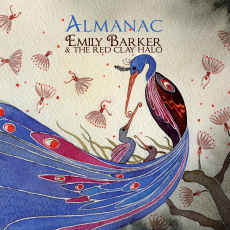Emily Barker - Almanac - BBC
What a peculiar place folk finds itself in at the start of 2011. A pleasant place, but nevertheless far from anticipated. With coverage of the recent Radio 2 Folk Awards more prominent than ever, winners like Chris Wood and Bellowhead beamed into the living rooms of new audiences, and folk-influenced artists Laura Marling and Mumford & Sons succeeding at the Brits – the latter outfit were shortlisted for a Grammy, too – it’s clear the genre is in rude health. It is poised, perhaps, for the first time in decades, to properly impress upon the mainstream.
So, what next? More artists in the Mumford mould, taking tropes from traditional songs but filtering influences through pop accessibility? Or great live bands like Bellowhead following (Roots Award-winners) the Levellers into the charts? Perhaps the answer lies somewhere between these two potential points, with artists like Emily Barker. Clearly schooled in the style of Britain’s folk convention and rooted in a time before tweed-clad boys went multi-platinum, acoustic guitars leading the way in a mix making space for accordion, brass and banjo, the Australian singer’s warm tones are easily the equal of any crossed-over artist. Working with the trio of Gill Sandell, Anna Jenkins and Jo Silverston – The Red Clay Halo – Barker adopts a point-man position for some wonderful four-part harmonies which envelop the listener, each vowel draped in the finest velvet.
Barker has already begun to make the right inroads – lead single Little Deaths, a delightfully woozy composition with an airiness that belies its portentous lyrical content ("It’s the little deaths of ideas / That dash me against the rocks"), has enjoyed support beyond folk circles, and her pre-Red Clay Halo releases were recommended by John Peel. Nostalgia, the opening track on Barker’s 2008 LP Despite the Snow, was used as the theme tune to BBC 1’s Wallander, and subsequently won a Bafta. With such fine groundwork laid, Almanac’s 11 tracks of pirouetting melodies, entrancing lyrics and overarching tone of endearing honesty will, surely, guide the singer to a greater level of recognition still. Everything’s here to make it so, certainly.
From the bucolic build that opens Billowing Sea, via the mournful strings of Dancers – which, again, treads a lyrical path to bodies of water – to the sumptuous climax of Bones, a song capping the album’s greatly graphical wordplay with talk of "a wound of a thousand cuts", this is a dream of a record. So perfectly formed is it that, chances are, the listener will need to go around again immediately, to make sure they weren’t imagining anything. A new Marling, then? No, Barker offers something else – vocals that soar and arrangements that shine, but all the time anchored by a strong, sincere respect for the heritage behind an inevitable rise.


